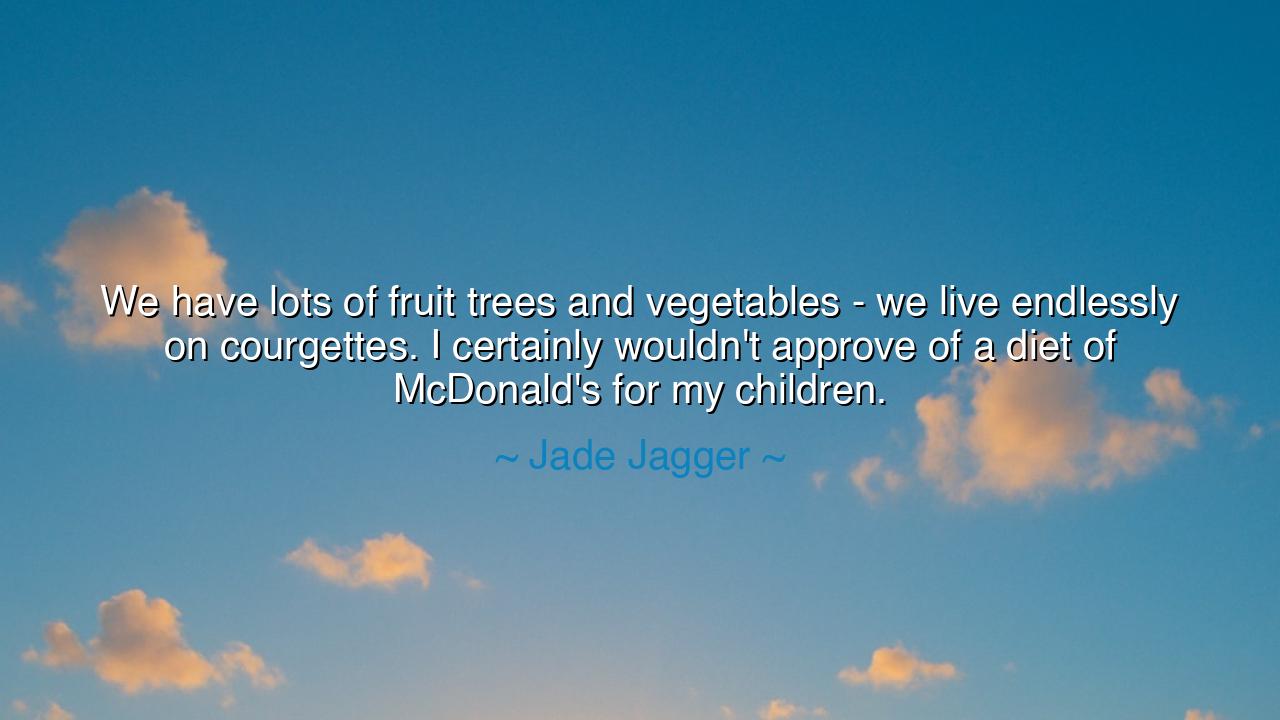
We have lots of fruit trees and vegetables - we live endlessly on
We have lots of fruit trees and vegetables - we live endlessly on courgettes. I certainly wouldn't approve of a diet of McDonald's for my children.






The words of Jade Jagger, “We have lots of fruit trees and vegetables — we live endlessly on courgettes. I certainly wouldn’t approve of a diet of McDonald’s for my children,” seem simple at first glance, yet they carry the weight of ancient wisdom — a call to return to the natural, to live in harmony with the earth that sustains us. Her statement is not merely about food, but about values, about the sacred bond between human beings and the soil, between nourishment and nurture. Beneath her words lies a truth as old as civilization itself: that the quality of what we eat shapes not only the body but also the soul.
In a world dominated by artificial abundance, where fast food has replaced slow growth and convenience has replaced connection, Jagger’s voice rises as a reminder of what humanity is forgetting. To “live endlessly on courgettes,” to eat from one’s own fruit trees and vegetables, is to live with awareness — to recognize that life’s true luxury is not found in the glitter of consumption, but in the simplicity of self-sustenance. The courgette, humble and green, becomes here a symbol of balance — a celebration of the ordinary, of food that grows not from machines but from patience, labor, and love.
The ancients understood this sacred rhythm of nourishment. In the philosophies of both East and West, to eat was a spiritual act. The Greeks worshipped Demeter, goddess of the harvest, who taught humankind that to cultivate the land was to cultivate virtue. In India, sages spoke of ahimsa, the principle of non-harm, guiding people to eat in a way that honors life rather than exploits it. Even in the scriptures of the desert, bread and fruit were seen as divine gifts — reminders that nature’s generosity demands reverence, not waste. Jagger’s refusal to “approve of a diet of McDonald’s” is thus not judgment, but an echo of that ancient reverence — a protest against the detachment that modernity breeds between man and his food.
The story of humanity’s downfall has often begun with the loss of connection to the land. When Rome grew wealthy, its citizens abandoned the soil and depended on imported grain from distant provinces. Bread grew cheaper, but the spirit of the people grew weak. The strength of the farmers, the simplicity of the field, gave way to indulgence and excess. The philosopher Cato the Elder, witnessing this decay, warned his countrymen that a people who forgets the earth forgets itself. So too, in our age, the rise of processed food and fast dining is not merely a change of diet — it is a loss of discipline, gratitude, and the sacred rhythm of the seasons. Jagger’s words, then, are not nostalgia but prophecy: a reminder that to feed one’s children from the earth is to teach them humility, patience, and respect for life.
The diet of McDonald’s she rejects is more than the physical act of eating; it represents a cultural hunger for speed, uniformity, and artificial pleasure. It is the food of disconnection — of lives lived too fast to notice what nourishes them. Against this, Jagger sets a different table: one filled with fruit from her own trees, vegetables pulled from her own soil. In this choice lies a return to integrity — the joining of what we consume with how we live. The courgette may not dazzle the tongue as sugar and salt do, but it satisfies something far deeper: the human longing for meaning in the everyday.
Her words also carry a mother’s wisdom — the fierce protectiveness of one who understands that the health of the next generation depends on the habits we cultivate today. To feed a child from the earth is to give them not only nutrition, but also roots — to teach them that the world is not a factory of pleasure but a living system of reciprocity. Each bite of a homegrown fruit carries a lesson in gratitude: the rain that fell, the soil that gave, the hands that worked. These are lessons that no plastic wrapper or drive-through meal can offer.
Let this then be the teaching: return to the earth. Seek your nourishment not from convenience, but from care. Plant something — even one small herb on a windowsill — and watch it grow, that you may remember the rhythm of life that fast food has made us forget. Cook with patience; eat with gratitude; feed your body with what strengthens it and your spirit with what humbles it. Teach your children that the world’s bounty is sacred, and that the simplest food, when grown and shared with love, is richer than all the feasts of kings.
For as Jade Jagger reminds us, abundance is not found in endless consumption, but in connection — in the quiet act of harvesting your own fruit, in the humble joy of a meal made with your hands. The true feast of life lies not in extravagance, but in harmony — with nature, with family, with the soul. And those who live by this truth will never hunger, for they will have remembered what the ancients always knew: that to live well is to live close to the earth, and to eat with reverence is to live in peace.






AAdministratorAdministrator
Welcome, honored guests. Please leave a comment, we will respond soon